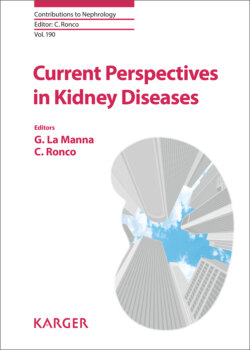Читать книгу Current Perspectives in Kidney Diseases - Группа авторов - Страница 30
На сайте Литреса книга снята с продажи.
RCA versus Heparin: Incidence of Bleeding
ОглавлениеTwo recent meta-analyses [10] confirmed the advantage of RCA over heparin in terms of incidence of bleeding during CRRT.
In particular, all studies considered by Wu et al. [9] assessed the incidence of bleeding, and a significant difference was found between the 2 groups (RCA vs. heparin), with fewer patients in the citrate group suffering from major bleeding (RR 0.34; 95% CI 0.17–0.65). The number of people needed to receive the treatment before one person would experience a beneficial outcome (number needed to treat) was 6.87.
Again, in a small study that randomized 48 patients for continuous veno-venous hemofiltration (CVVH) with RCA or systemic heparin anticoagulation, Betjes observed a significantly higher incidence of bleeding and highlighted that the mean need for red blood cell transfusion was more than double in patients receiving unfractioned heparin (0.88 vs. 0.43 units of packed red blood cell per day of CVVH) [11]. More recently, in a larger study, Morabito et al. [12] likewise showed a lower transfusion rate during RCA-CVVH than with heparin (0.29 vs. 0.62, p = 0.017) or no-AC (0.29 vs. 0.64 blood units/day, p = 0.019), probably in part due to the significantly lower need for filter set replacement during RCA-CVVH. In addition, RCA was associated with an increase in the platelet count and antithrombin-III activity, thus avoiding platelet concentrate administration and antithrombin-III supplementation.
If the use of citrate is associated with a lower hemorrhagic risk (compared to heparin) and a reduction in blood loss for technical reasons (lower number of filters replaced), it would be reasonable to expect an indirect positive effect on the survival as well, but no strong evidence is presently available about any such possible favorable effects of RCA. Only in one large single-center randomized trial, including 200 critically ill patients on CRRT using nadroparin or citrate anticoagulation, was RCA associated with a surprising 15% absolute increase in 3-month survival, which was not fully clarified by the lower incidence of bleeding. Moreover, post-hoc analysis revealed that RCA might be particularly advantageous in specific clinical conditions (e.g., surgery, sepsis, severe multiple organ dysfunction syndrome, and younger age). To explain this survival advantage of RCA, the authors called into question the possible positive effect of citrate in the “inflammation network” (less polymorphonuclear and platelet degranulation due to hypocalcemia inside the filter, more substrate availability for citric acid cycle maintaining redox state) [13].
Two subsequent multicenter randomized trials, as large as the previous one, comparing unfractioned heparin with RCA in 170 [14] and 212 [15] patients undergoing CRRT, disconfirmed the RCA survival benefit. Finally, the recent meta-analysis by Liu et al. [10] clarified that there was no significant difference in mortality between the citrate and heparin groups.
